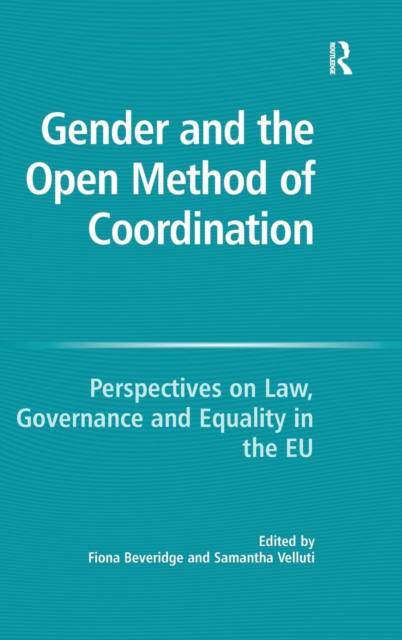
Bedankt voor het vertrouwen het afgelopen jaar! Om jou te bedanken bieden we GRATIS verzending (in België) aan op alles gedurende de hele maand januari.
- Afhalen na 1 uur in een winkel met voorraad
- Gratis thuislevering in België vanaf € 30
- Ruim aanbod met 7 miljoen producten
Bedankt voor het vertrouwen het afgelopen jaar! Om jou te bedanken bieden we GRATIS verzending (in België) aan op alles gedurende de hele maand januari.
- Afhalen na 1 uur in een winkel met voorraad
- Gratis thuislevering in België vanaf € 30
- Ruim aanbod met 7 miljoen producten
Zoeken
Gender and the Open Method of Coordination
Perspectives on Law, Governance and Equality in the EU
Samantha Velluti
Hardcover | Engels
€ 190,95
+ 381 punten
Omschrijving
Containing contributions by some of the best known researchers in the field, this volume considers the intersection between the Open Method of Coordination (OMC), a relatively new mode of policy-making, and gender equality, a long-standing area of EU policy. It draws on a range of disciplinary perspectives to examine the effectiveness of the OMC as a medium for the advancement of gender equality within the EU. It also considers gender in the OMC in a variety of contexts and at both a general EU and Member State level. Central to the discussion is the concept of gender mainstreaming which proposes that a gender equality perspective should be incorporated at every level and opportunity of EU policy and practice. The authors assess how successful this has been in the context of the OMC. The book provides a unique and contemporary body of work on the OMC which adds significantly to existing understandings of this form of governance and informs critical debate of EU social governance.
Specificaties
Betrokkenen
- Auteur(s):
- Uitgeverij:
Inhoud
- Aantal bladzijden:
- 226
- Taal:
- Engels
Eigenschappen
- Productcode (EAN):
- 9780754673439
- Verschijningsdatum:
- 28/09/2008
- Uitvoering:
- Hardcover
- Formaat:
- Genaaid
- Afmetingen:
- 156 mm x 234 mm
- Gewicht:
- 498 g

Alleen bij Standaard Boekhandel
+ 381 punten op je klantenkaart van Standaard Boekhandel
Beoordelingen
We publiceren alleen reviews die voldoen aan de voorwaarden voor reviews. Bekijk onze voorwaarden voor reviews.









